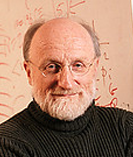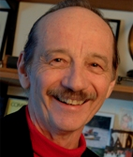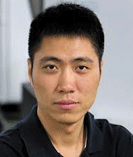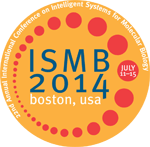This is an old revision of the document!
CAMDA 2014 Conference
The 13th CAMDA conference will be held in Boston, United States from Friday, July 11 through Saturday, July 12, 2014. As in recent years, CAMDA runs as a Satellite Meeting of the Annual International Conference on Intelligent Systems for Molecular Biology (ISMB).
Currently, the Big Data explosion is the grand challenge in life sciences. Analyzing large data sets is emerging to one of the scientific key techniques in the post genomic era. Still the data analysis bottleneck prevents new biotechnologies from providing new medical and biological insights in a larger scale. This trend towards the need for analyzing massive data sets is further accelerated by novel high throughput sequencing technologies and the increasing size of biomedical studies. CAMDA focuses on the analysis and integration of the massive data sets in life sciences. It provides new approaches and solutions to the big data problem, presents new techniques in the field of bioinformatics, data analysis, and statistics for handling and processing large data sets.
CAMDA focuses on the specific challenges and opportunities in the analysis of the massive data sets that are increasingly produced in several fields of the life sciences. The conference offers researchers from the computer sciences, statistics, molecular biology, and other fields a unique opportunity to benefit from a critical comparative evaluation of the latest approaches in the analysis of life sciences' “Big Data”.
This year, CAMDA's scientific committee set up three challenges to integrate multi-track -omics data:
- dual dose response profiles for 14 unknown and 2 known compounds from the InnoMed PredTox project of the EU FP7 program;
- selected cancers from International Cancer Genome Consortium (ICGC), and;
- the prediction of drug compatibility from an extremely large toxicogenomic data set.
Keynotes
Chris Sander, PhD
Presentation Title: t.b.a.
Short Bio: Christian Sander is a Computational Biologist and chair of the Computational Biology Programme at the Memorial Sloan–Kettering Cancer Center in New York City. He originally trained as a physicist receiving his first degree from the University of Berlin in 1967. Later he gained a PhD degree after studying at the State University of New York, the Niels Bohr Institute in Copenhagen and the University of California, Berkeley. Sander's current research interests are in computational genomics and systems biology, with a focus on network pharmacology and the development of targeted combinatorial therapy in cancer. His group uses the results of high-throughput sequencing to compute protein 3D structures and functional sites; and studies the regulation of gene expression by small RNAs. In 2012, he is active in the International Cancer Genomics Consortium, the NIH Cancer Genome Atlas Project, the NCI Integrative Cancer Biology Program and a leader in the bioPAX and PathwayCommons community efforts to create an open-source information resource for biological pathways. He has published more than 250 peer-reviewed articles in physics and biology with an h-index of 100. Previously, Sander co-founded the research section of the European Bioinformatics Institute in Cambridge, England, and was founding chair of the department of Biocomputing at the European Molecular Biology Laboratory in Heidelberg. He is a Fellow of the International Society for Computational Biology.
Temple F. Smith, PhD
Presentation Title: t.b.a.
Short Bio: Temple F. Smith is university professor in biomedical engineering. In 1981 he developed together with Michael Waterman the Smith-Waterman algorithm, which serves as the basis for multiple sequence alignments, identifying the segment with the maximum local sequence similarity. He was director of the BioMolecular Engineering Research Center at Boston University for twenty years and is now Professor Emeritus. In 1969 he obtained his PhD in the Physics Department, University of Colorado at Boulder. Consecutively, he did his Postdoctoral research in the Department of Biophysics and Genetics, University of Colorado Medical School, Boulder.
Jun Wang, PhD
Presentation Title: t.b.a.
Short Bio: Jun Wang is the Executive Director of the BGI (previously known as the Beijing Genomics Institute). He was instrumental in the 1999 founding and the growth of the BGI Bioinformatics Department, which is now widely recognized as one of world’s premier research facilities committed to excellence in genome sciences. Dr. Wang also holds a position as an Ole Rømer professor at the University of Copenhagen. He has authored 200+ peer-reviewed original papers – of which 73 are published in Cell, Nature (including Nature series), N Engl J Med., and Science (23 as cover story). Among those 73, Jun Wang is the first/co-first author or corresponding/co-corresponding author for 48 (13 as cover) of them. He has been recognized with an award from His Royal Highness Prince Foundation in Denmark, Nature’s 10 - the year in Science (2012); an Outstanding Science and Technology Achievement from the Chinese Academy of Sciences, Top 10 Scientific Achievements in China, and the prize for Important Innovation and Contribution from the Chinese Academy of Sciences. His research focuses on genomics and related bioinformatics analysis of complex diseases and agricultural crops, with the goal of developing applications using the genomic information.
Leading scientists from around the world are selected to present their analyses in talks, complemented by poster sessions. Papers based on the submitted extended abstracts submitted for presentation at the meeting are published in the conference proceedings. Starting with 2012, CAMDA has entered a partnership with Landes Biosciences, publishing the CAMDA Proceedings as an open access PubMed indexed special issue of Systems Biomedicine.
As in last years, there will be prizes for the best contributed analysis / presentations. The three prize winners will receive a free one-year subscription to F1000Prime (worth $250) and a free submission to F1000Research (worth $1000). The first prize winner will additionally receive the prestigious CAMDA award.
We look forward to welcoming you to Boston!












STAY CONNECTED
Tweet